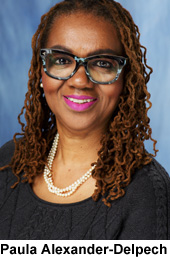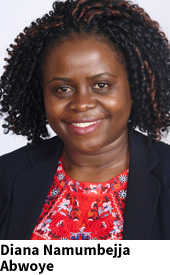The authors share personal reflections.

The next Institute for Global Healthcare Leadership (new name) will be held 13-15 November 2019 in the Washington, D.C., area. The registration deadline is 16 October.
It was empowering, by Paula Alexander-Delpech
 For nursing, global leadership was initially personified by a young social reformer by the name of Florence Nightingale. Moved by newspaper reports she read of horrendous conditions experienced by British soldiers wounded in the Crimean War, she challenged nurses in her country to leave their homes and travel with her to Turkey—nearly 2,500 miles distant on the Anatolian Peninsula—to care for the soldiers. Through her example and writings, Nightingale became known for her advocacy and helped define global leadership for nursing. London was thus a fitting location this past September when nurse leaders from around the world gathered for the Emerging Global Healthcare Leadership Symposium. [For future symposia, the name has been changed to Institute for Global Healthcare Leadership.] An Edith Anderson Leadership Education Grant from the Sigma Foundation for Nursing helped fund my attendance.
For nursing, global leadership was initially personified by a young social reformer by the name of Florence Nightingale. Moved by newspaper reports she read of horrendous conditions experienced by British soldiers wounded in the Crimean War, she challenged nurses in her country to leave their homes and travel with her to Turkey—nearly 2,500 miles distant on the Anatolian Peninsula—to care for the soldiers. Through her example and writings, Nightingale became known for her advocacy and helped define global leadership for nursing. London was thus a fitting location this past September when nurse leaders from around the world gathered for the Emerging Global Healthcare Leadership Symposium. [For future symposia, the name has been changed to Institute for Global Healthcare Leadership.] An Edith Anderson Leadership Education Grant from the Sigma Foundation for Nursing helped fund my attendance.
Presentation topics included global health understanding and measurement, the global economy, global health workforce planning, and safety and security concerns. Also addressed were acculturation of global migrants and sociocultural and political awareness. Case studies enabled the audience to hear personal stories about the journeys that presenters took in becoming global leaders. Attendees were challenged to reflect on their own purposes, values, and unique attributes that contribute to their becoming global leaders. It was empowering to hear from people who, like Nightingale more than 150 years ago, challenged their nurse colleagues to make a difference.
A primary focus of the symposium was finding solutions to global issues. It was clear that money alone cannot solve many of the world’s health problems. Rather, dedicated people working together are needed to create sustainable infrastructures. One presenter said all nurses must practice “active hope,” which she defined as something we do rather than something we have. Another observed that nurses make a difference by crafting personal legacies as global leaders. We were all challenged to identify our personal values by determining how—based on relevant needs—our strengths can solve or improve negative situations. Need thus becomes the driving factor in compelling one to become a global leader.
We all recognized that we are very much alike, despite our diverse geographic origins. It is, therefore, imperative that we be aware of challenges and threats to global healthcare. As borders become less evident and the world becomes smaller, global citizens face threats of conflicts, natural disasters, malnutrition, and infectious diseases. Acknowledging these realities, one speaker stated that, rather than depending on Nobel Prize-winning research, we need to focus on risk reduction, prevention, global solidarity, and investment in social equity. Thus, a question asked frequently throughout the symposium was, how can we as global leaders engage?
Many answered that question by focusing on the Sustainable Development Goals, developed by the World Health Organization. Derived from the Millennium Development Goals, introduced in 2000 to combat poverty, hunger, disease, illiteracy, environmental degradation, and discrimination against women, the Sustainable Development Goals serve as a useful road map for creating sustainable infrastructures.
The important connection between social media and global leadership was also acknowledged during the symposium. One presenter, recognizing that tools such as Twitter can help advance needed healthcare policies, cautioned the audience to remember that facts alone do not influence—they need legs.
Empowered by what we heard over the course of those four days in London—the home of Florence Nightingale—we left the symposium committed to doing our part to fulfill Sigma’s mission: advancing world health and celebrating nursing excellence in scholarship, leadership, and service.
Paula Alexander-Delpech, PhD, APRN, PMHNP-BC, is a clinical assistant professor at the University of Florida in Gainesville, Florida, USA.
I appreciated the curriculum, by Diana Namumbejja Abwoye
 As a recipient of an Edith Anderson Leadership Education Grant, made possible by donations to Sigma Foundation for Nursing, I had the opportunity to attend the Emerging Global Healthcare Leadership Institute in London, United Kingdom, this past September. Sigma’s Institute for Global Healthcare Leadership sponsored the event. My goals were to learn more about global health, understand the role of a nurse leader in global health, and create a global network that would help me foster my own global outreach.
As a recipient of an Edith Anderson Leadership Education Grant, made possible by donations to Sigma Foundation for Nursing, I had the opportunity to attend the Emerging Global Healthcare Leadership Institute in London, United Kingdom, this past September. Sigma’s Institute for Global Healthcare Leadership sponsored the event. My goals were to learn more about global health, understand the role of a nurse leader in global health, and create a global network that would help me foster my own global outreach.
The symposium had phenomenal speakers—all nurses—and attendees were enthusiastic about learning. As a student aspiring to become a nurse leader in global health, I appreciated the curriculum and how it was organized.
In London, I gained a new perspective on global health. I realized that it is not just “out there” on the other side of the world. It relates to each one of us. Global health—or lack of it—is in our communities and neighborhoods. Because of globalization, populations from around the world are represented in communities in my local area of Massachusetts (USA). So knowing about global health helps prepare nurses to better care for increasingly diverse populations.
Several institute speakers pointed out that nurses can be very influential in global health. They can be effective policy activists, policy entrepreneurs, and social justice advocates. As a result of listening to those presenters, I came to believe that, if they can advocate effectively on behalf of many around the world, we all can.
They said money doesn’t solve all global healthcare problems, and I agree. As one who has volunteered in various parts of the world, I know that many organizations throw money at emerging problems without a sustainable plan. And I agree with several of the speakers who recommended working directly with locals in their own communities because they know the culture. They know how to survive and will remain in the area to help sustain a project after we leave. Many of the world’s biggest problems do not require a lot of money to solve. In the case of healthcare, what communities often need most are clean water and basic supplies.
While at the conference, I reflected about a class session I had had a week earlier. We were discussing the future of nursing and the likelihood that many nurses will soon retire. I was concerned about the years of experience that will be lost to healthcare because experience is knowledge. As Roger Watson, PhD, RN, FRCP Edin, FRCN, FAAN, a professor at the University of Hull in the UK—and an RNL blogger—presented on the topics of influencing and implementing, I found my answer for how soon-to-retire nurses can pass on their knowledge to the next generation of nurses. They simply have to influence and implement, while keeping in mind that “facts alone do not influence; facts need legs.” I challenge nurse leaders to embark on that road.
As one who has worked in countries with limited resources, I appreciated learning from Siobhan O’Halloran, PhD, FFNMRCSI, RGN, RMHN, RNT, chief nurse in Ireland’s Department of Health. She taught us to speak the monetary language if we want to get funding for projects. Her message that language matters resonated with me. It’s a skill I’m going to use when working in developing countries.
When doing outreach work, I often worry about the safety of our group. It was, therefore, reassuring to hear Baroness Caroline Cox, a member of the House of Lords and founder of the Humanitarian Aid Relief Trust, discuss safety and security guidelines to follow when working in high-risk areas. She emphasized the importance of having local partners and trusting them to help protect you because of the relationships you have built. That stuck with me.
Elizabeth Rosser, DPhil, RN, MN, Dip N Ed, Dip RM, RNT, PFHEA, a member of Sigma’s board of directors, spoke about her experience as a global migrant and her acculturation to countries where she practiced. Her presentation helped me realize how important it was for me to prepare colleagues and classmates before traveling to Uganda for outreach work in late 2018. Before hearing Rosser, I did not realize how challenging it is to relocate from a place of privilege to a place with limited resources and a different culture—and to work in the new area without feeling you are doing harm. I now know the importance of finding resources and connecting with others who have taken that journey.
I wish every student nurse could have this experience because it helps shape your perspective on global healthcare. RNL
Diana Namumbejja Abwoye, RN, an MSN/FNP student at Simmons University School of Nursing in Boston, Massachusetts, USA, is a global partner of Our Bodies Ourselves.
Editor’s note:
The next Institute for Global Healthcare Leadership (new name) will be held at the Gaylord National Resort & Convention Center in National Harbor, Maryland, USA (Washington, DC) from 13-15 November 2019. The deadline for registering is 16 October.